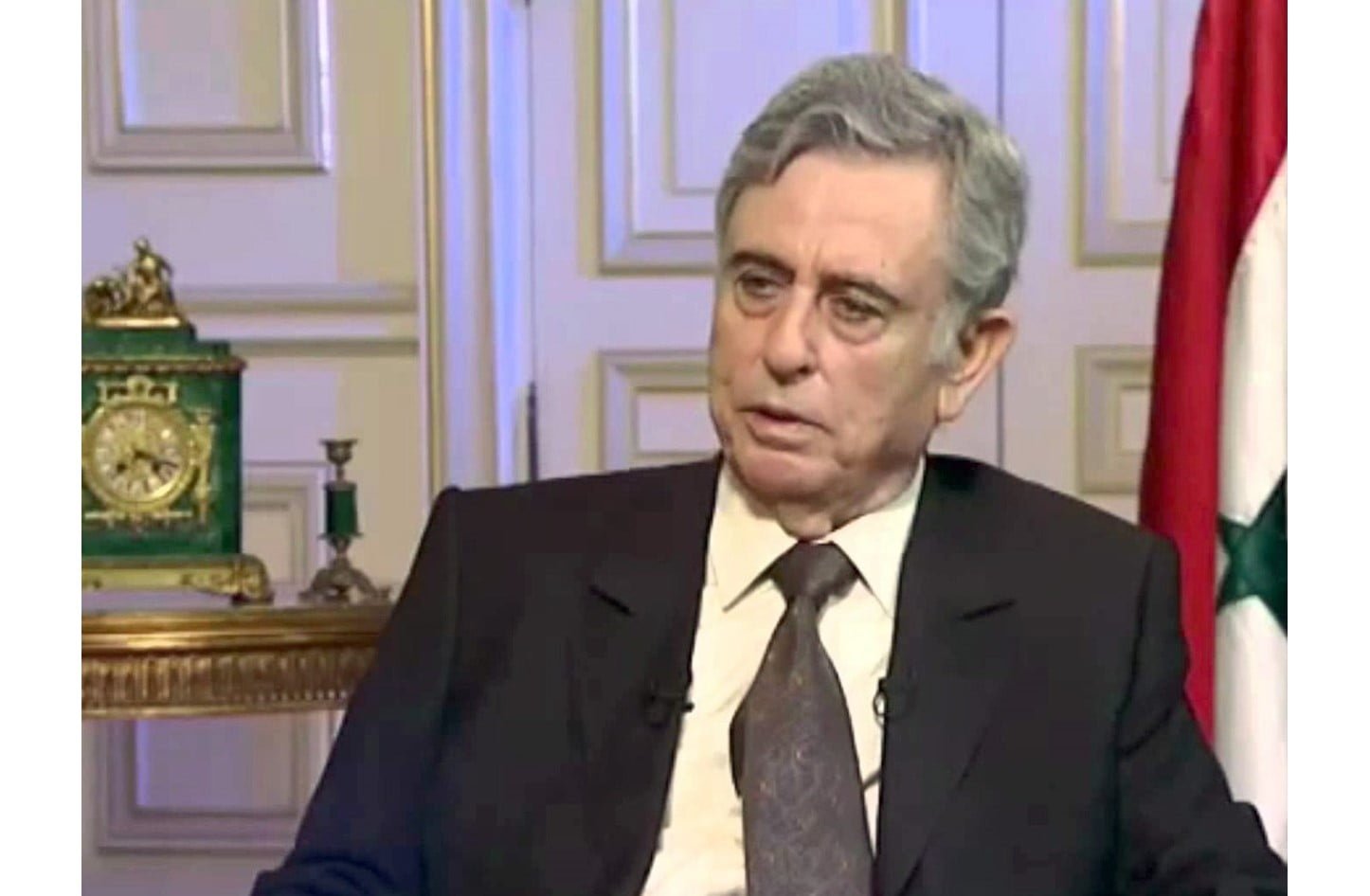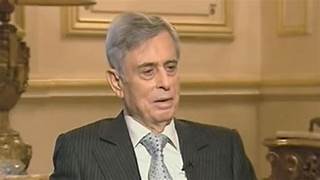The Syrian uprising compelled Abdel Halim Khaddam, the former Syrian vice president, to break his silence and admit to “Al-Masri Al Yom” that he was once part of the Syrian regime. He emphasized his willingness to appear before any investigation committee or Arab or international court to address the corruption accusations leveled against him. “Al-Masri Al Yom” conducted an interview with Khaddam in Brussels, Belgium, where he currently resides.
■ How sincere is the Syrian regime in implementing reforms that address the aspirations of the Syrian revolution?
- None of the Syrians hold any expectations for genuine reforms. The word “reform” has been echoing among Syrians since July 2000 until the present day. Bashar has consistently evaded genuine reform. In June 2005, significant decisions were made during the Qatar Party Congress, which endorsed a direction of reform in the state, society, and the party. These decisions included the release of public freedoms, freedom of the media, and an end to security interference in the country’s affairs. However, six years have passed, and these decisions have remained stagnant in the files.
■ President Al-Assad has stated that reform takes time. What is your take on this?
- The draft party law has been sitting in the party’s files since 2005, as has the draft media law. What studies are they waiting for? The issue is not about studies; it’s an evasion tactic to pass a certain stage and then backtrack on the promises.
■ In Assad’s initial speech before the People’s Assembly, he mentioned a conspiracy and strife plaguing the country. What is the reality behind this conspiracy and strife?
- “Conspiracy” is a term firmly entrenched in his mind, like recording a conversation on a phone or a recording device. Whose conspiracy is it? The conspiracy is orchestrated by the regime itself! I mean, are the people who have been subjected to repression, persecution, impoverishment, the abuse of dignity, and terrorism for 40 years the ones responsible?
■ So, you are accusing the Syrian regime of conspiring against its own people?
- The conspiracy exists within the regime’s mindset, and we are now witnessing how it manifests. The regime attempts to remove this by accusing the young people who have begun demanding freedom, fearing for their future and the future of the country. They call for freedom, democracy, justice, and equality. The regime accuses them of being part of a conspiracy. Furthermore, they accuse some individuals of being associated with terrorist organizations, responsible for the killing of protesters and security personnel. This is a well-known tactic employed by dictatorial regimes: suppressing dissent, introducing repressive laws, and attributing conspiracy charges to others.
■ The emergence of the phenomenon known as “Shabbiha” or thugs in the Syrian events. Who are they?
- The Shabbiha consists of members of the Republican Guard, the “Assad Fedayeen” brigade in the army and security services, as well as various smuggling groups. The Shabbiha phenomenon began during Hafez al-Assad’s rule. While Assad used to speak against corruption, he took no action against his own relatives. The influence expanded, reaching other parts of the country. Once the older generation passed away, their children stepped in. Each group formed their own armed smuggling faction.
■ You acknowledge that you were part of the Syrian regime, but as one of its engineers. Based on your words, can it be said that you were involved in the conspiracy in Syria?
- Firstly, the primary party responsible for the conspiracy is the decision-maker. I was not the decision-maker and had no role in internal politics. The head of state, along with the security services, held the authority in domestic affairs. Sometimes, the Prime Minister or certain ministers were also involved. In terms of foreign policy, I had responsibilities, but I was not the sole decision-maker. I acted as a partner, developing programs and implementing actions to execute foreign policy. I am proud of the contributions I made on critical and fundamental matters. The regime did not experience significant failures in terms of foreign policy and did not make any concessions that compromised the state’s territorial integrity or sovereignty.
■ However, you held responsibility for the Lebanese file, and numerous mistakes were made in Lebanon. Do you accept responsibility?
- Yes, yes, yes… I was responsible for the Lebanese file and the political management of it. Security matters, on the other hand, were not under the purview of the committee I was a part of since all security agencies in Syria were directly linked to the head of state. For instance, the Military Intelligence Division should have been accountable to the Chief of Staff or the Minister of Defense. However, they had limited knowledge about the division’s activities, as they relied on the reports provided by the head of the division. All reports were directly submitted to the president, who made the decisions. Even though the Minister of Interior had legal responsibility for the Political Security Division, the division’s reports were submitted directly to the President of the Republic. While the head of the security and reconnaissance branch in Lebanon was part of our committee, the head of the Military Intelligence Division refused to work in the committee for objective reasons. General Azzi Kanaan was appointed instead, and he engaged in discussions on political matters and contacts with officials in Lebanon. Personally, neither General Hikmat Shihabi nor I directly contacted any Lebanese official through the security services.
■ However, as the Vice President of the Republic, didn’t you have a role in influencing or expressing your opinion to President Assad, whether it was the father or the son, regarding the role of the security services in Lebanon and their excesses?
- I relinquished involvement in the Lebanese file since 1998. There was a presidential election cycle, and President Hafez Al-Assad was inclined towards General Emile Lahoud. From my perspective, General Lahoud’s election would complicate matters for Syria because Lebanon should not have a military president. I had discussed this matter with President Hafez several times, but he insisted on his position. After Lahoud’s election, I informed the President that I could no longer oversee the Lebanese file because President Lahoud was aware of my stance on his election, and it wouldn’t serve the relations between us since everything would refer back to my position on him. Therefore, I stepped away from the Lebanese file. However, there were occasional difficulties that required my intervention with certain Lebanese parties. In those cases, I would make contact, engage in discussions, and so forth.
■ You spoke about corruption and its files in Syria, but are you also accused as one of the pillars of the regime involved in corruption cases?
- I challenge the regime to present even a single corruption case in which either I or any of my relatives have been convicted, even up to the twentieth degree. If such a thing exists, I challenge them to form an Arab or international commission of inquiry.
■ Or a national commission?
- No, “Wataniya” will operate under the supervision of the regime and security. I propose an “Arab and international” commission, as long as it investigates all corruption cases in Syria. I will provide all the information I have, and Bashar will provide his files, to determine who is corrupt.
■ What if the Syrian regime changes and an impartial national commission of inquiry is established? Would you be willing to appear before it in this case?
- Of course, I would be ready to appear before an impartial national commission of inquiry if the Syrian regime changes.
■ What if you are convicted? Would you be prepared to accept the results?
- Absolutely, if I am convicted, I must face the consequences. If I commit any act that harms the country, the people, or their interests, I am responsible, as are my family members up to the twentieth degree.
■ So Abdel Halim Khaddam is not afraid of arrest or accountability?
- I am not afraid at all. I can assure you that the Syrian people will soon bring killers and thieves to justice and put them in prison.
■ Do you deny that your children had companies and interests, and that they benefited from your position of power to further their own interests?
- My eldest son works in Saudi Arabia. The second son founded a company with three non-Syrian partners that had no connection to Syria. Their production was not even sold to any Syrian institution.
■ Did your other children not benefit from your position of power?
- What do they benefit from?
Whenever I express a viewpoint that goes against the general line, the security services launch a campaign against me and accuse my children and me. I challenge them to provide a single condemning file against me.
■ Mr. Khaddam, you admit that you are part of the Syrian regime.
- Yes, I am part of the regime.
■ Do you take responsibility?
- Yes, I bear the moral responsibility of being part of the regime. I acknowledge this, but I do not accept being held accountable or considered responsible for the crimes committed by the regime.
■ What do you believe will happen to the Baath Party if the regime falls?
- We must differentiate between the Baath Party in the 1950s, where the Baathists were advocates who were not controlled by the authority. They defended the people, their rights, and national causes. In the face of threats to the country, they were not inflexible. They participated in a government of national unity driven by national responsibility.
■ And the current Baath Party?
- The current Baath Party in Syria, with its constitution, values, and slogans, effectively ceased to exist with the dissolution of the party on February 22, 1958, when unity was established between Syria and Egypt. Former Baathists have formed four parties, all of whom are former leaders of the party. Each party has its own history, and each believes it is doing what is right.
■ What are your thoughts on the future of the revolution in Syria?
- These young people will succeed in achieving their goals. Syria will reclaim its democratic system, and Syrians will regain their full freedoms and exercise their basic rights as citizens in terms of both rights and duties.
■ And what about the future of the regime after the revolution succeeds?
- Just like other regimes pursued by the people, they should be held accountable.
■ What lies ahead for Khaddam?
- I will be honest and clear with you. Since I announced my resignation from my leading positions in the party and the state, I have made the decision to step away from the political arena. After spending over 60 years of my life in political activities, I have chosen to serve my country on a national level in ways that do not involve holding any leadership position in the state or any political party. We must make way for the younger generations to assume their roles and shape their own future, just as we did when we were their age.
■ So, Abdel Halim Khaddam is stepping away from political involvement?
- This revolution belongs to the youth. It is the duty of Abdel Halim Khaddam and all parents who have engaged in politics to pass the torch to these young individuals and support them, rather than burdening them.


